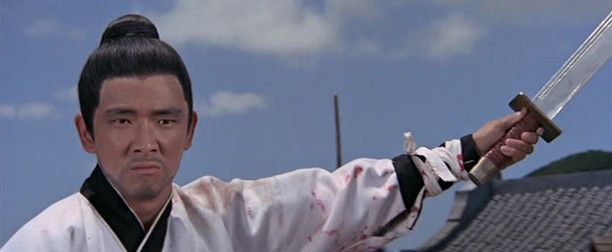Return of the One-Armed Swordsman (Chang Cheh, 1969)

Chang Cheh’s sequel to his hit 1967 superhero movie finds Jimmy Wang Yu’s hero happily retired to a farm life when he’s asked to join a competition. It seems the top eight local bandits have gathered under one leader and are holding a contest to see who in the martial world gets to claim the title “Sword King”. This is, of course, a ruse to draw out all the local hero-types and capture or kill them. Wang refuses of course–he has no interest in the martial world any longer–but after the first wave of slaughter his remaining human sympathies drag him into the fight by the students of the ensnared masters, who beg for his help.
What follows is a video game schematic plot as Wang and the students take on one bad guy at a time and work their way up to the Big Boss. Each of the villains has a gimmick, and they’re organized as pairs of opposites (one has a sword on a chain, so he attacks from far away (and is played by Lau Kar-leung), a woman uses her wiles to get in close and attack from there, etc). The oppositions are: Near-Far, Above-Below, Strength-Weakness (Poison), Day (wheel-like swords in the shape of suns)-Night (the final villain, who stealth attacks in the darkness). Wang thinks up clever ruses to defeat most of the bad guys, like a net for the strong man, or standing on bamboo trees for the guys who attack from below, but mostly the fight scenes are just lots of people getting killed. Lots and lots of people, an excessive amount, really.
Gradually it becomes apparent that these are not your typical fun and games action movie deaths. The sheer volume of the calamity becomes thematic: it’s not a movie about action, it’s a movie about death. The villains have no real motivation. The heroes have no distinct personality. Wang is disgusted by the whole thing, but goes through the motions of killing all the bad guys because he’s the only one that can. As the film nears its conclusion, Chang lingers more and more on the aftermaths of the battles, the bodies piled everywhere. The befuddled, powerless yet rescued masters, all their sons and students needlessly slaughtered, can think only to give Wang a shiny gold medal. The villains aren’t characters, in the sense that they aren’t really people. They’re ambition personified, that desire to be the best that drives people to destruction. Only Wang, with his single-minded dedication to his family and his desire to withdraw from worldly concerns is able to defeat the bandits. While so many heroic sons have died, sacrificing themselves for honor and clan, he learns his wife is pregnant.
